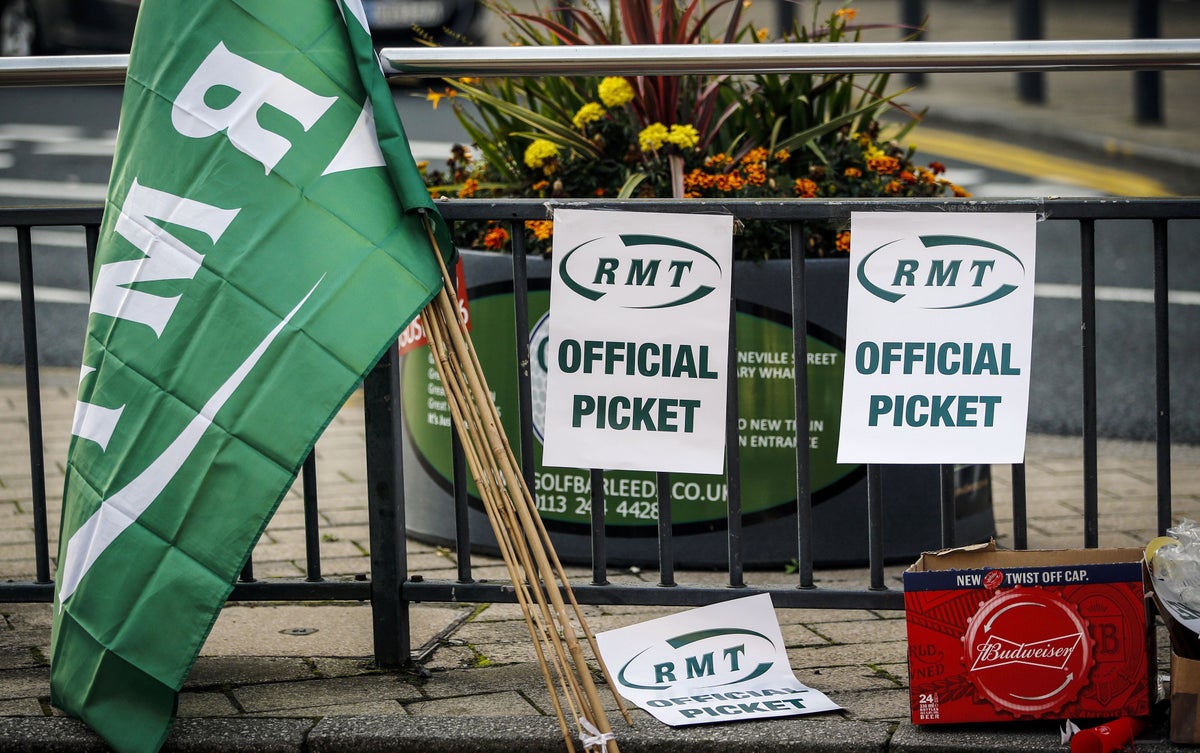
Unions have reacted with anger to planned legal changes to allow agency workers to fill in for striking staff, branding the Government as “desperate to distract from its numerous failings”.
The plan emerged in response to rail strikes later this month which will cripple train services because of disputes over pay, jobs, pensions and conditions.
The move would involve reversing a restriction preventing employers from hiring agency workers to cover for striking staff and would apply to all sectors, according to The Sunday Telegraph.
Transport Secretary Grant Shapps told the newspaper any legal intervention would not affect “this particular set of strikes” in June, but should the action continue then “further measures certainly would come in during this particular dispute, if it can’t be resolved”.
“I’ll be saying more about this. But we will be looking at the full suite of modernisation that’s required,” he said.
Using agency workers to try and break strikes would put these workers in an appalling situation, worsen disputes and poison industrial relations
Plans to make the legal adjustment are reportedly being drawn up by officials in the Department for Business, Energy and Industrial Strategy.
TUC deputy general secretary Paul Nowak said: “This Government is desperate to distract from its numerous failings by picking a fight with unions.
“Allowing agency staff to replace striking workers would undermine the right to strike and be extremely reckless.
“Bringing in less qualified and experienced staff to deliver important services would create genuine safety risks for the public and for the workforce.
“Using agency workers to try and break strikes would put these workers in an appalling situation, worsen disputes and poison industrial relations.
“Some may not realise until it is too late that they are being asked to break a strike.
“Having repeatedly promised a high-wage economy, ministers now seem determined to reduce workers’ bargaining power and to make it harder for working people to win fair pay and conditions.
“Let’s call this out for what it is. The PM is throwing red meat to his rebellious backbenchers to try and shore up his position.”
Rail, Maritime and Transport union general secretary Mick Lynch said: “Grant Shapps needs to stop smearing the RMT and unshackle the rail operating companies so they can come to a negotiated settlement that can end this dispute.
“Railway workers voted overwhelmingly for strike action in defence of their jobs and for a pay rise that deals with the rising cost of living.
“It is insulting to them to suggest they do not understand the issues that affect their daily lives or cannot make a democratic decision by themselves.
“We already have the most restrictive anti-democratic trade union laws in western Europe and if the Government attempts to reduce our rights further, the RMT along with the rest of the trade union movement will mount the fiercest resistance possible.”
Writing in The Sun on Sunday, Mr Shapps said workers could also be banned from working overtime to make back pay lost during industrial action.
It comes after he told The Sunday Telegraph in May that ministers were looking at drawing up laws which would make industrial action illegal unless a certain number of staff are working.
Sharon Graham, Unite general secretary said: “If the Government continue to fly this ‘false flag’, then the trade union movement must be ready to respond.
“Workers have had enough of being told by the rich and powerful to meekly accept what they are given. It is profiteering corporations, not ordinary workers who are driving the latest surge In inflation and making fools of us all.
“Rather than attack the rights of workers, it is high time that politicians of all parties argued for a cap on profits not pay.
“Why is it OK for faceless corporations to rip off the public through price gouging but not for workers to take action to defend their living standards?
“With British workers already subject to the most restrictive labour laws in Europe, as a nation we need to think again about in whose interests we want our economy to run.”

Unison general secretary Christina McAnea said: “The Government’s focus should be on a plan to help the country through the cost-of-living crisis, not engineering a distracting spat with unions.
“Using agency workers isn’t safe and only serves to sour relations between employers and their employees.”
Northern Ireland Secretary Brandon Lewis told LBC that “no decision has been made yet” on whether to bring in agency workers, and claimed rail sector staff were “well-rewarded”, with a median salary of £46,000 a year compared to the national average of £26,000.
Labour’s Rachel Reeves said she did not “want to see strikes” and called on the Government to work with industry instead of “sowing chaos, sowing division”.
The shadow chancellor told the BBC: “The rail workers are part of what kept our economy going during the pandemic, they were some of the key workers who we clapped, who kept things going during those really difficult times.
“They are not the enemy here, they are looking to secure a good deal for their workers and I understand why they are trying to do that.”
Former Tory leader Sir Iain Duncan Smith said the “damage” strikes can cause to industry by disrupting people’s means of getting to work should be taken into consideration, possibly with an option for prosecution.
He told BBC Radio 4’s The World This Weekend: “It’s important that consideration is taken of the damage that that will do – particularly when it comes to transport – to the lives of those who actually themselves are using that transport link to get to work themselves.
“So the damages to the industries that are reliant on the work that takes place needs also to be taken into consideration, whether that allows prosecution to take place or there to be further action.”
Joanne Galbraith-Marten, director of employment relations and legal services at the Royal College of Nursing, said: “This change would be undemocratic and unsafe.
“Any industrial action by our members is very carefully planned to keep patients safe already – bringing in less qualified or agency workers instead could put patients at risk.
“Health professionals face the most draconian anti-trade union laws. The Government curtails their right to be heard because it knows it is failing them. Silencing health workers silences the patient voice too. Any attempts to further limit workers’ rights to challenge their unfair treatment will be strongly resisted.”







